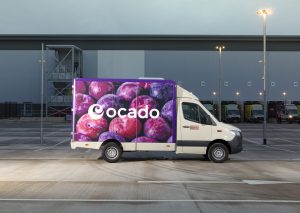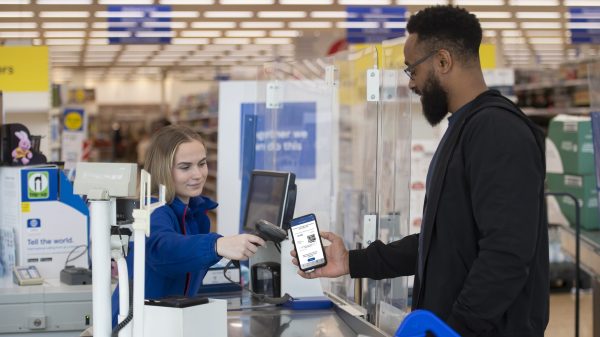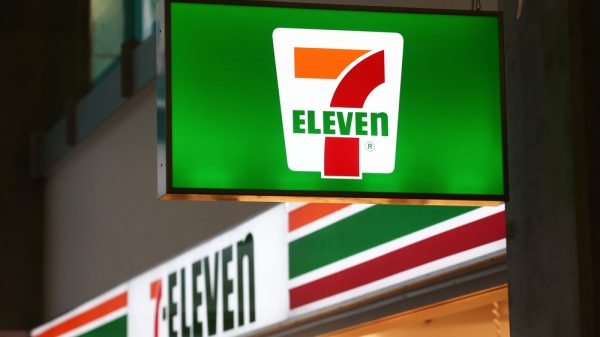Online grocery shopping may have surged during the pandemic, however in the aftermath the channel has failed to sustain that growth.
Until now. Ocado, the UK’s biggest online-only supermarket, was named the fastest growing retailer for the past 12 weeks by both Kantar and NIQ.
With Asda, Tesco and Sainsbury’s also performing well online right now, is it staging a comeback?
We take a look at what Ocado’s doing to gain customers and growth, how other supermarkets are performing in comparison, and if demand for the online grocery channel is here to stay.
How has Ocado taken top spot as the fastest-growing grocer?

According to Kantar, Ocado was the fastest growing supermarket in March, having improved sales by 9.5% in the latest 12 weeks.
It was also the only grocer other than Waitrose to boost its number of shoppers in the last three months.
NIQ also named Ocado the fastest growing supermarket, with its latest data citing sales growth of 13% over the last 12 weeks and an increase in market share from 1.5% to 1.6% in the first quarter of the year.
According to NIQ head of retailer insight Mike Watkins, Ocado has been gaining sales momentum since around this time last year, however its positive golden quarter allowed this to carry through to the first quarter of 2024.
He says that this comes down to “very strong” customer metrics, shoppers, visits and spend.
“Clearly inflation’s helped, but based upon our data, their average spend per shopper is up by 11% and that’s above inflation.”
Watkins says that this growth is in part down to Ocado having “very committed and very loyal” shoppers.
“It’s been heavily investing in customer engagement and it’s been very successful,” he explains, adding that there was “a surge of new shoppers towards the end of last year”.
Watkins also praises Ocado’s “massive commitment” to its pricing offer.
“They price match 10,000 Tesco products – the biggest price match in the UK and that does include price matching against Clubcard discounts.”
However, Ocado hasn’t always had such a successful performance.
While it saw a boom in consumer demand during the pandemic with its share price hitting a record 2,895p in September 2020, its value plummeted almost 80% as shoppers returned to stores since Covid restrictions eased.
In the first half of 2023, the retailer reported an underlying loss of £2.5m.
However, the grocer has since undergone its ‘Perfect Execution’ programme, which CEO Hannah Gibson said looked to offer “unbeatable choice and reassuringly good value, and with leading service.”
The plan focused on improving the availability, quality and life of each product on the site, and increasing the M&S product offer.
It appears to be working. In its latest trading update for the 13 weeks to 3 March 2024, Ocado sales jumped 10.6% to £645.3m, while volumes were up 8.1% to £242.1m.
Over this period, it extended its product range “with the strong growth of core M&S grocery lines,” which Gibson said helped in “further enhancing slot and product availability”.
Retail consultant and ex-John Lewis customer experience director Peter Cross says that Ocado’s success has also been driven by its longstanding ability to provide a top-quality service for its customers.
“From the homepage onwards are promises of the friendliest drivers on the road and the most award winning call centre in the land.
“Someone has done their homework and, with its sights firmly set on securing the Which? award for the best online supermarket in Britain, is consistently delivering a winning combination of approachable and effortless service, easy to secure slots, low substitutions, broad range for most budgets, niche brands and Tesco price matching,” he explains.
Kantar strategic insight director Tom Steel also points out that Ocado has also been relying heavily on its coupon campaign to drive an increase in customer. At the time of writing, new customers can save 25% on their first order alongside three months of unlimited deliveries.
He explains that while other retailers use such offers, they are “not as clear” as Ocado’s, with the online supermarket also having “the highest amount of trips that feature a coupon”.
Can Ocado continue this positive momentum?

Steel says that while this isn’t the first time that Ocado has made a big coupon push, it chose to do so “a lot earlier this year”, which as a result has seen it “getting shoppers to shop there more often and increase their basket size”.
“Within the total market, the trend is that people are shopping less often – Ocado is going against the trend,” Steel adds.
While he doesn’t believe Ocado’s performance will “drop off,” he says that its recent success “is heavily supported by its couponing push,” adding that “it can’t obviously run that promotion forever”.
According to Ocado’s latest trading update, it expects mid to high single digit percentage revenue growth for the 2024 financial year.
Watkins believed that this estimation is broadly reflective of the wider online market.
“The difference between online growth and store growth will be 1% or 2% rather than 5% or 6%. We’re getting back to a ‘next normal’.”
How are other supermarkets performing online?

While Ocado’s performance stands out across the sector, the online channel as a whole continues to perform well.
According to Kantar data, online share of grocery sales has edged up to 12% in the four weeks to 17 March 2024, from 11.7% the prior year.
Steel explains that Ocado “doing really well” will account for some of this uptick. However, he adds that “the likes of Asda, Tesco and Sainsbury’s are all seeing growth through their online channels as well”.
Many of the UK’s leading supermarkets have been ramping up their online offerings in recent months in a bid to make the customer shopping journey more straightforward and appealing.
In October, Sainsbury’s launched its loyalty offering ‘Your Nectar Prices’ for the first time on Sainsburys.co.uk, allowing users to get personalised prices online as well as in stores.
More recently, Co-op introduced member pricing to its online shop, offering the same benefits online as members can receive in-store.
Meanwhile, in November Waitrose invested in delivering personalised online shopping to its customers, having struck a partnership with Netcore Unbxd to implement a suite of AI-driven tools and develop new features that improve both the online search and browsing experience.
Is online growth likely to continue?

Steel says that currently, online “is growing ahead of total grocery”.
However, he flags that this could, in part, be down to the easing of the cost-of-living crisis with shoppers starting to opt for convenience over value.
Steel also suggests that online growth could be fuelled by the “slow down” in the growth of Aldi and Lidl.
“They were doing really well and they still are to an extent, but their share and growth isn’t as strong as it was this time last year and we’re seeing that come through in different channels,” he explains.
“I think online is one of those benefactors where, because the discounters aren’t quite as strong as they were last year, it’s opened room for online to grow.”
Watkins says that “online as the big grocery shop is here to stay”.
He also believes that it won’t necessarily pose a concern to in-store shopping, but rather run alongside it as part of the “omnichannel” format.
“People are shopping across more channels, be it at a value retailer, an online shop or convenience store. It’s something that happened during the pandemic when online share went from 7% of the grocery market, peaked at 16%.”
Today it is back to around 12%.
“It’s a reset, it will continue to grow slowly,” says Watkins. “But the reason it will continue to grow over the next four or five years is that it offers a big shopping basket and we’re finding it’s starting to cannibalise the big hypermarket shop.”
He adds that this changing consumer lifestyle is also reflected in the new wave of grocery shoppers.
“Generation Z are certainly economically active They were brought up with apps and online shopping. Younger people have less need to wander stores in a way that was done probably five years ago.”
As we enter this “omnichannel” era, it’s hard to imagine a shop without the option of online.
While Ocado certainly has the potential to remain on top of the pack, other supermarkets have the opportunity to take a chunk of the growing online grocery market.










